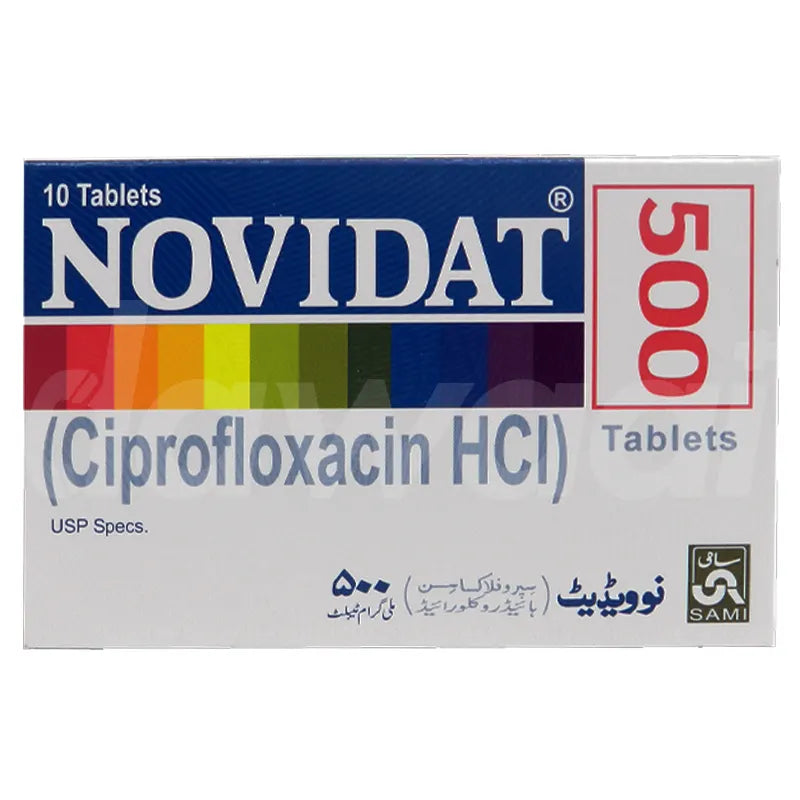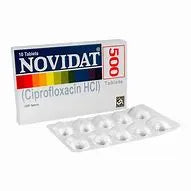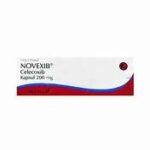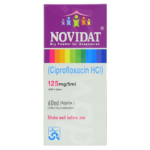Description
Ciprofloxacin is a broad-spectrum antibiotic belonging to the fluoroquinolone class. It works by inhibiting the bacterial enzyme DNA gyrase, which is essential for bacterial DNA replication. This prevents bacteria from multiplying and ultimately leads to their death. Ciprofloxacin is effective against both gram-positive and gram-negative bacteria and is commonly prescribed for respiratory, urinary tract, skin, gastrointestinal, and bone/joint infections.
Uses
Doctors prescribe Ciprofloxacin 500mg for the treatment of:
-
Respiratory tract infections (including pneumonia, bronchitis, sinusitis).
-
Urinary tract infections (UTIs), kidney, and bladder infections.
-
Bone and joint infections.
-
Gastrointestinal infections (including traveler’s diarrhea, typhoid fever).
-
Skin and soft tissue infections.
-
Prostatitis and epididymitis in men.
-
Certain sexually transmitted infections.
-
Prophylaxis before surgery (in specific cases).
Dosage
-
The usual dose for adults: 500mg once or twice daily for 7–14 days (depending on infection type).
-
Severe infections: may require 750–1000mg twice daily.
-
Maximum dose: 4000mg per day.
-
Always follow your doctor’s exact prescription.
-
Complete the full course even if symptoms improve.
Overdose: May cause severe nausea, vomiting, dizziness, seizures, or kidney complications. Seek emergency medical care immediately.
Missed Dose: Take as soon as remembered. If it is almost time for your next dose, skip the missed dose. Do not double dose.
How to Use
-
Take orally with a full glass of water.
-
May be taken with or without food.
-
Avoid taking with dairy products (milk, yogurt) or antacids as they reduce absorption.
-
Drink plenty of fluids while on this medication.
-
Take at the same time each day for best results.
When Not to Use
Do not use Ciprofloxacin if you:
-
Are allergic to ciprofloxacin or other fluoroquinolones (e.g., levofloxacin, norfloxacin, ofloxacin).
-
Have a history of tendon disorders related to fluoroquinolone use.
-
Are pregnant or breastfeeding (unless prescribed by a doctor).
-
Have severe kidney or liver impairment without dose adjustment.
Side Effects
Common side effects include:
-
Nausea, vomiting, stomach upset, diarrhea.
-
Headache, dizziness.
-
Loss of appetite.
-
Sleep disturbances.
Serious (rare) side effects:
-
Tendon rupture or tendonitis.
-
Seizures or mood changes.
-
Severe allergic reactions (swelling, rash, difficulty breathing).
-
Changes in heart rhythm (QT prolongation).
Precautions & Warnings
-
Use with caution in patients with seizure disorders, heart problems, or aortic aneurysm history.
-
May cause photosensitivity; avoid excessive sunlight or tanning beds.
-
Use carefully in elderly patients and those with renal impairment.
-
Avoid alcohol while taking Ciprofloxacin, as it may worsen side effects.
-
Do not use for viral infections (e.g., flu, common cold).
Drug Interactions
Ciprofloxacin may interact with:
-
Antacids (aluminum, magnesium), iron, zinc, calcium – reduce absorption.
-
Warfarin – increases bleeding risk.
-
NSAIDs – may increase risk of seizures.
-
Theophylline – increases toxicity risk.
-
Rifampicin, carbamazepine, phenytoin – may reduce Ciprofloxacin effectiveness.
Food Interactions
-
Avoid dairy products close to dosing.
-
Avoid alcohol, as it increases side effect risks.
-
High-fat meals may delay absorption slightly but not effectiveness.
Storage & Disposal
-
Store at room temperature (20–25°C).
-
Protect from light, heat, and moisture.
-
Keep out of reach of children.
-
Do not use expired tablets. Dispose of safely as per pharmacist’s guidance.
Laboratory Screening
During Ciprofloxacin therapy, your doctor may monitor:
-
Kidney and liver function tests (for long-term use or high doses).
-
Blood counts if on prolonged therapy.
-
ECG in patients with heart disease or those on QT-prolonging drugs.
-
Blood sugar levels in diabetic patients.
Quick Tips
-
Take exactly as prescribed; do not skip doses.
-
Drink plenty of fluids daily.
-
Protect your skin from sun exposure.
-
Avoid heavy exercise; Ciprofloxacin can rarely cause tendon damage.
-
Report severe diarrhea, tendon pain, or allergic reactions immediately.
Doctor’s Overview — Dr. Asim Rauf, MBBS, FCPS
Ciprofloxacin is an antibiotic used for many bacterial infections, especially urinary tract and respiratory infections. It works well but should always be taken as a full course to prevent resistance. Patients should avoid taking it with dairy products and report any tendon pain or unusual side effects.
Disclaimer
This overview is for educational purposes only. Ciprofloxacin is a prescription medicine and should be used only under the supervision of a qualified healthcare professional.













Reviews
There are no reviews yet.